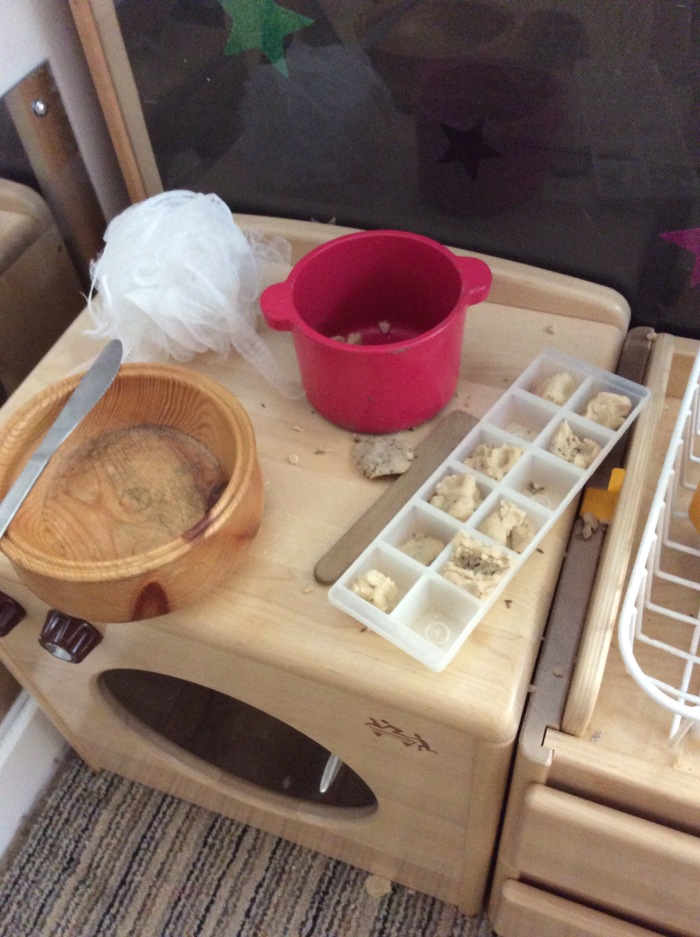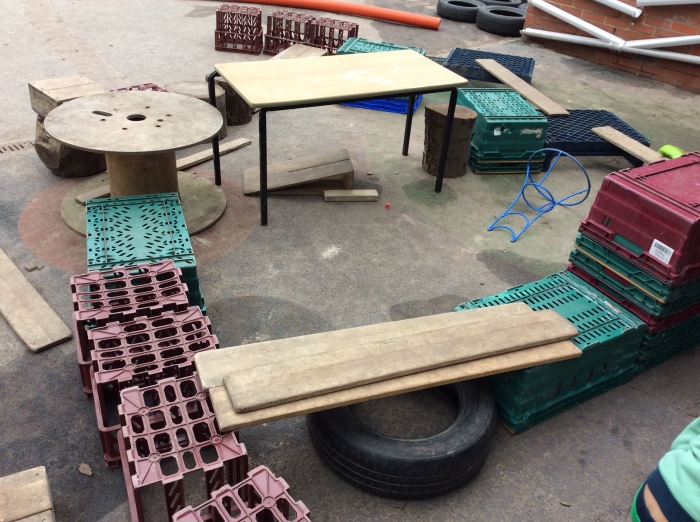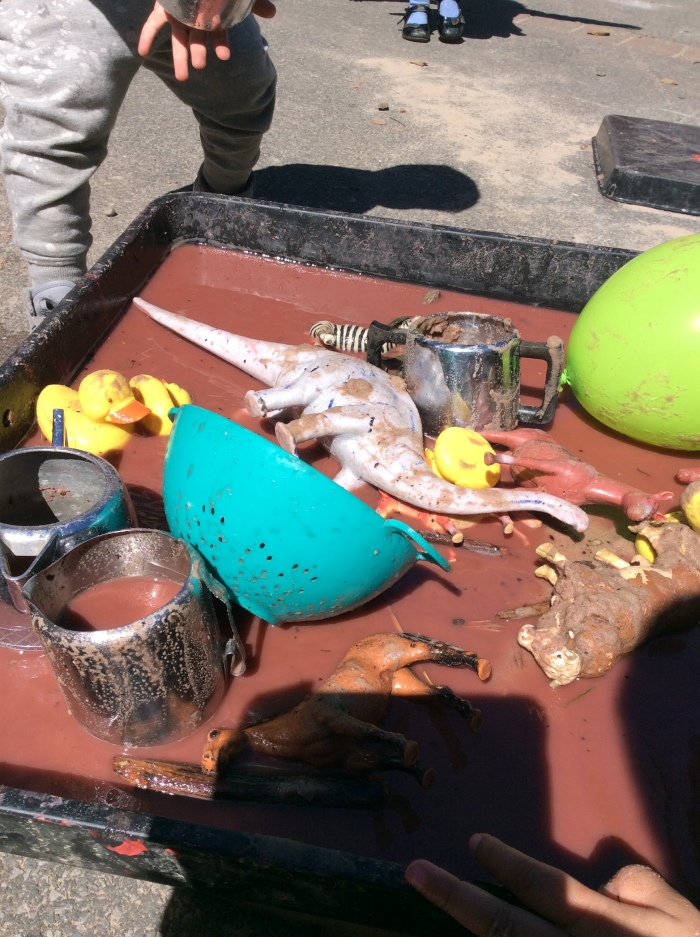
This week in my 2 year olds room, children took play dough and curry spices into the home area and their play and this picture makes me happy. I would have never let this happen a few years ago, much less let them use a table knife! I include other pictures below for similar reasons, they make me happy and I wouldn’t have seen anything valuable in them or the play experiences that led to them before.
Most adults don’t know a thing about babies, young children and early childhood development in general. Sadly many early childhood educators & teachers don’t know that much either. Sadder still, we tend to know more than most other adults but our working conditions and the pressure of “academics” pushing into our field keeps us from trusting and acting on what we do know.
Data for data’s sake, assessment detached from our day to day practice, number crunching, ridiculous notions of “school readiness,” benchmarks to achieve, GLD (Good Level of Development) benchmarks in the UK and equivalent high-stakes expectations in other countries all keep too many early years educators fenced in, stressed out and afraid to take the first steps necessary in changing their deeply held views of children and what our jobs could look like.
Three decades of groundbreaking research can’t do much against centuries of cultural baggage that sees children as cute but empty-headed semi-humans. Our work is stressful, but as a whole we adults make it so much harder than it needs to be. As Dan Hodgins says, we make “moral isssues out of developmental ones” and spend far too much time battling, scolding, praising, yelling, sticker charting and otherwise manipulating children into obeying us. Many of us joke it’s like “herding cats,” but maybe we should realise cats aren’t meant to be herded!

I’ve now worked in Early Years for 10 years. Might be hard to be believe but I’ve been ambivalent and embarassed about this for most of this time. I’ve been a “warm body” in a room more times than I would like to admit. In my practice I have done almost every dumb and damaging thing to children under the sun. I got into this work because I “like kids” but I have had far too many days where I couldn’t stand being in a room with them. In essence this was because the job felt like, and really was, just being a classroom cop.
Don’t run inside. Sharing! Don’t build the tower so high. You need to share! Clean those up now. Clean up! Stop playing, go wash your hands and come eat now. Stop playing and come to a circle time. Sit criss-cross apple sauce. Stop fidgeting. I love the way Anna is sitting, well done Anna. Go play now. If you two can’t share I am going to have to put this toy away! Okay Joseph can have it for five more minutes and then it’s your turn. Don’t climb on that. Share please! I’ve told you three times now, go sit down behind the desk! Please stop running inside.
Why would we expect anybody to enjoy this for a job? I never did but I didn’t know things could or should be different. In my first setting even though I got quite “good” at them, I hated circle times but continued to do them all the same. I don’t know how to explain this feeling but it wasn’t until I heard Dan Hodgins and Amy Ahola talk about circle time that I heard others affirm a little voice in the back of my head that I wasn’t yet able to listen to. Before hearing their podcast episode, I always preferred impromptu, smaller and non-mandatory “circle times.” Unsurprisingly, when children had the choice to come in close to listen to a story or sing songs, to sit how they like and leave when they liked, the process was much more enjoyable for us all!
Similarly at my first setting, I hated our “work times” and so did the children. We would stop children’s play and make them come sit at tables to do things we thought were important. I got to a point that whenever I was the only adult in the room, I would simply not do them. I didn’t have any actual evidence or knowledge to back up this choice, I simply didn’t want to do something we all hated. Honestly it was little more than laziness at the time but I do think I instinctively knew that it’s more important for young children to be having fun. I now trust that voice more than ever.
Like I said though, I was not yet ready to listen and act on this feeling. I still thought part of the job of circle time was getting children to obey me, sit on designated carpet squares and learn “self-control,” (i.e. stop fidgeting and annoying me when I am trying to read them a book!). I did not yet know that well-loved and children naturally learn self-control as they get older and thought it was something we adults had to socialise into them. Circle times sucked, but that was part of the job, and who am I to suggest to the team and our manager (not too mention our professional parents expecting their children to be “kindergarden ready”) that maybe we should try something else? Lunch needs to get set up anyways, and we can’t have the kids running around then..
Hearing Amy and Dan fully blow apart the idea of mandatory circle times was truly a revelation. For the first time I heard others reflect a feeling I’ve had about my job that I basically ignored and it was a major part of turning on my reflective practitioner switch.
Most politicians don’t know anything about what we do, or what they actually want from us but in saying our field needs to improve, they are in effect expecting wide scale individual personal transformation from a stressed-out workforce fenced in by criminally low-wages and an education system warped by high stakes testing and accountability. Personal transformation takes courage and the willingness to step into the unknown. It takes faith in ourselves to trust that little feeling or voice in the back of our heads. It requires humility in realising there is always more for us to learn and we do not have all the answers. In our context, it also requires freedom in the workplace to experiment, try things out and have some real say over the way things are done. How many early years settings operate like this?
High stakes benchmarks set by people who have never set foot in our settings create, or appreciate that every class of kids is always going to be different, create a stark and simplistic view of what our jobs are and what it means to be good at them.
I don’t think people who don’t work in early years can understand the general pressure and disrespect that we feel as a field and I am not sure I can fully describe it but I will try. We take pride in our work, and love the relationships with the children and the thank you cards from some parents but because it is not respected by others, we often look for external valididation and proof that we are doing a good job.
To prove that we do more than “just play with them all day,” we have children do cookie cutter arts and crafts because the parents love how cute it is compared to what children would actually make on their own. We don’t know enough about the power and purpose of play and and too often set up activities only to mark off developmental checklists and collect “data” because that’s just part of the job description.
I am only now at a point where I beginning to learn enough about early childhood development, and confident enough in my own practice to realise that this job can be so much more than what I’ve first though. I am learning to truly see children as actual humans worthy of full respect here and now, to trust in putting relationships and deep play with them first in everything I do, to continue to hone my observation skills to see children’s play for what it really is, to not take young children’s behaviour personally and focus on being in the moment with them as much as possible. I now trust that strong, secure relationships and play are more than enough.

Somehow I’ve turned from a “warm body” Classroom Cop into a reflective practitioner who spends their Saturday mornings ranting on their blog. I now truly my work and am endlessly fascinated by it. I don’t expect people not in the choir to be reading this but I hope for others in the field to get their reflective practitioner switch flipped on as well. If it can happen for me, it can happen for anybody but for it to happen on a wide and long-lasting scale, we need to massively invest an unprecedented amount into the field. It is plain stupid to expect teachers dealing with the stress of poverty wages to give their hearts and minds over to quality reflective practice. There are many who do, and stay in the field out of the sheer passion for it, but there are clearly not enough to round out a quality workforce. No amount of quality training is going to address issues stemming from low wages, stress, burn-out and high turn over.
Side bar: Part of my personal transformation is that I am an anamoly in more ways than one. Besides being a man, I am from a comfortable middle-class background and am married to an atmospheric scientist. Unlike so many of my coworkers, I don’t have children to look after when I go home. More than this, I have been raised on the far end of the vocabulary gap, grew up around tons of books and was brought up encouraged to think for myself in so many ways. I don’t say this navel-gaze but just sharing what obviously informs my world view. I’d be very interested in hearing from EY educators from backgrounds different than mine on all these topics. I know my experience in this practically all female field is not representative at all.
Money talks and shows what we value in a society. We can’t keep relying on the heartstrings and low wages of passionate educators to subsidise an essential field that not only keeps the rest of the economy working today but is literally raising the next generation. Educators trusted and respected in the form of better pay, suitable working conditions are far more able to move into a reflective place where they can learn to trust and respect children in turn.
Best thing I’ve read in ages
LikeLiked by 1 person
Thanks so much! Would love to hear more what you think if you have time!
LikeLike
Thank You for this. It’s the most descriptive article explaining the realities of switching over that I have ever read. Most talk about the importance of the transformation but do not share the how or the struggle and the reality of doing it. I can’t wait to read part 2. This also came at an extraordinary time as our upcoming staff meeting was going tone focused exactly on this topic! So thank you!
LikeLiked by 1 person
Thanks so much for reading and the nice words. Yeah I am beginning to feel the approach I am learning from so many others isn’t really the skillset I thought the job was at first. I think explicitly talking about what this “other” skillset/approach is would be really useful.
For what it’s worth, this was one of the first articles I’ve read that gave me that feeling. Direct, simple descriptions of ways adults can encourage independent, possibly “risky” play: http://www.nature-play.co.uk/blog/five-easy-steps-for-the-observer
LikeLike
Thank you for sharing! I’m glad I found your blog. I can completely relate to the gut feeling versus what is expected of us as early childhood teachers. I can see learning happening all around me and it both inspires and excites me -BUT- then I struggle with being able to properly share what I see and know to be true with the parents and my colleagues. The continued pressure to produce what parents want to see is exhausting. I don’t enjoy it and neither do the children. I know that doing things the way they’ve always been done will not change the field. It will take people like you, people who follow their gut while also spreading the word, to inspire the rest of us to find the courage to follow ours as well.
LikeLiked by 1 person
Thanks for reading! I sympathize with that feeling of not knowing how to approach others. I’m currently at a place where I realize I can’t really change other people’s views directly or quickly at all. I’ve just tried my best to find a setting I can be as much as myself as I’d like and hope through “practice osmosis” I can influence others slowly. If that makes any sense at all! I also try to just focus on things I want to focus on changing my own practice each day.
LikeLike
Beautifully written post. My wife and I are both teachers (she teaches infants and I teach preschool), and I just finished a blog post about the difficulties of raising our newborn daughter with our wages.
I agree that there is a lot to be down about. High student-teacher ratios, students with undiagnosed developmental delays, and stressful work conditions can sometimes leave me feeling like I don’t have the energy to do anything but be “meat in the seat.” But like you said, sometimes the best learning happens when we let go of all the stipulations and control. Sometimes, maintaining unrealistic expectations is exactly what is preventing students from achieving their potential.
Have you looked into Reggio Emilia at all? I sounds like it might be an educational method that is right up your alley.
LikeLiked by 1 person
Yeah like I said my entire view of my work has changed as I’ve learned to let go more of that control. Also significiantly I am only working in early learning half-days at the moment. I am sure Reggio has impacted my practice but more than anything I am excited by playwork approaches to working with children personally.
This work is hard and can be stressful but I think more than anything, us adults (as a whole) make it more stressful than it needs to be. This isn’t to blame any individual teacher’s approach, but the way we collectively view young children and what working in early learning is “supposed” to look like.
LikeLiked by 1 person
Not used to getting so many comments here! Thanks all for reading and responding!
LikeLike